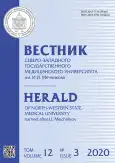Прогноз и эффективность этиотропного лечения эндометрита после кесарева сечения при изоляции возбудителей группы ESKAPE
- Авторы: Коробков Н.А.1, Бакулина Н.В.1, Кахиани Е.И.1
-
Учреждения:
- Федеральное государственное бюджетное образовательное учреждение высшего образования «Северо‑Западный государственный медицинский университет имени И.И. Мечникова» Министерства здравоохранения Российской Федерации
- Выпуск: Том 12, № 3 (2020)
- Страницы: 35-40
- Раздел: Оригинальные исследования
- URL: https://journal-vniispk.ru/vszgmu/article/view/34916
- DOI: https://doi.org/10.17816/mechnikov34916
- ID: 34916
Цитировать
Аннотация
Цель — определение частоты изоляции лекарственно устойчивых ESKAPE-патогенов (rESKAPE) при эндометрите после кесарева сечения, оценка прогноза заболевания и результатов стартовой эмпирической антимикробной терапии при изоляции полирезистентных возбудителей.
Методы. Проведен ретроспективный анализ всех случаев эндометрита после кесарева сечения в Санкт-Петербурге. Период исследования: сентябрь 2008 — сентябрь 2019 г.
Основные результаты. Из 255 случаев эндометрита после кесарева сечения 68 (26,7 %) были обусловлены патогенами группы rESKAPE. У родильниц с эндометритом, вызванным rESKAPE-патогенами, чаще отмечены клинические неудачи при назначении стартовой эмпирической антимикробной терапии, чем при эндометрите другой этиологии (р = 0,0012); тяжелое течение инфекционного процесса с угрозой его генерализации и гистерэктомией (р < 0,05).
Заключение. Эндометрит после абдоминального родоразрешения, вызванный rESKAPE-патогенами, связан с неблагоприятным прогнозом заболевания и высоким риском отсутствия эффекта от антимикробной терапии.
Ключевые слова
Полный текст
Открыть статью на сайте журналаОб авторах
Николай Александрович Коробков
Федеральное государственное бюджетное образовательное учреждение высшего образования «Северо‑Западный государственный медицинский университет имени И.И. Мечникова» Министерства здравоохранения Российской Федерации
Автор, ответственный за переписку.
Email: nikolai_korobkov@mail.ru
ORCID iD: 0000-0001-7279-2535
доцент кафедры акушерства и гинекологии
Россия, Санкт-ПетербургНаталья Валерьевна Бакулина
Федеральное государственное бюджетное образовательное учреждение высшего образования «Северо‑Западный государственный медицинский университет имени И.И. Мечникова» Министерства здравоохранения Российской Федерации
Email: nv_bakulina@mail.ru
ORCID iD: 0000-0003-4075-4096
SPIN-код: 9503-8950
Scopus Author ID: 7201739080
ResearcherId: N-7299-2014
http://www.researcherid.com/rid/N-7299-2014
д.м.н., проф., зав. каф. терапии и клинической фармакологии
Россия, Санкт-ПетербургЕкатерина Инвериевна Кахиани
Федеральное государственное бюджетное образовательное учреждение высшего образования «Северо‑Западный государственный медицинский университет имени И.И. Мечникова» Министерства здравоохранения Российской Федерации
Email: dr.ekaterina@mail.ru
д.м.н., профессор, декан педиатрического факультета, зав. кафедрой акушерства и гинекологии имени С.Н. Давыдова
Россия, Санкт-ПетербургСписок литературы
- De Socio GV, Rubbioni P, Botta D, et al. Measurement and prediction of antimicrobial resistance in bloodstream infections by ESKAPE and Escherichia coli pathogens. J Glob Antimicrob Resist. 2019;19:154-160. https://doi.org/10.1016/j.jgar.2019.05.013.
- Mulani MS, Kamble EE, Kumkar SN, et al. Emerging strategies to combat ESKAPE pathogens in the era of antimicrobial resistance: A review. Front Microbiol. 2019;10:539-545. https://doi.org/10.3389/fmicb.2019.00539.
- Santajit S, Indrawattana N. Mechanisms of antimicrobial resistance in ESKAPE pathogens. Biomed Res Int. 2016;2016: 2475067. https://doi.org/10.1155/2016/2475067.
- Sandiumenge A, Lisboa T, Gomez F, et al. Effect of antibiotic diversity on ventilator-associated pneumonia caused by ESKAPE organisms. Chest. 2011;140(3):643-651. https://doi.org/10.1378/chest.11-0462.
- Sandiumenge A, Rello J. Ventilator-associated pneumonia caused by ESKAPE organisms: Cause, clinical features, and management. Curr Opin Pulm Med. 2012;18(3):187-193. https://doi.org/10.1097/MCP.0b013 e328351f974.
- Chaintarli K, Lenglet A, Beauzile BD, et al. High prevalence of ESBL-positive bacteria in an obstetrics emergency hospital and neonatal care unit — Haiti, 2016. Infect Control Hosp Epidemiol. 2018;39(11):1381-1383. https://doi.org/10.1017/ice.2018.213.
- Udo EE, Al-Sweih N. Dominance of community-associated methicillin-resistant Staphylococcus aureus clones in a maternity hospital. PloS One. 2017;12(6):e0179563. https://doi.org/10.1371/journal.pone.0179563.
- Rodríguez-Bano J, Navarro MD, Romero L, et al. Clinical and molecular epidemiology of extended-spectrum β-lactamase — producing Escherichia coli as a cause of nosocomial infection or colonization: Implications for control. Clinical Infectious Diseases. 2006;42(1):37-45. https://doi.org/10.1086/498519.
- Rodríguez-Bano J, Navarro MD, Romero L, et al. Epidemiology and clinical features of infections caused by extended-spectrum beta-lactamase-producing Escherichia coli in nonhospitalized patients. J Clin Microbiol. 2004;42(3):1089-1094. https://doi.org/10.1128/JCM.42.3. 1089-1094.2004.
- Kramarov SO, Yevtushenko VV. Carbapenems in clinical practice. Actual Infectology. 2019;7(2):57-62. https://doi.org/10.22141/2312-413x.7.2.2019.161149.
Дополнительные файлы









